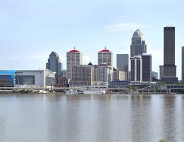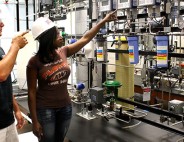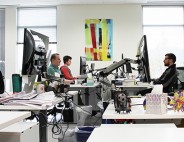Kentucky: A Strategic Partner for Business
01 May, 2016
Interview with Erik Dunnigan, Acting Secretary Kentucky Cabinet for Economic Development
Q-What is the current “state of the state”?
A-In many ways, Kentucky sets an example for the nation. We just completed two back-to-back years of record investments by businesses locating new facilities in Kentucky and expanding existing operations.
For those efforts, Kentucky won a second consecutive national Governor’s Cup award recognizing that, among all U.S. states, Kentucky captured the highest amount of new and expanding business investment per capita.
Kentucky’s unemployment rate stood at 5.8 percent in February, and many companies across the state are currently seeking to fill positions or plan to hire this year.
Also, Kentucky’s exports continue to break year-over-year records. With $27.6 billion in goods and services exported to nearly 200 countries in 2015, Kentucky’s products are clearly in demand across the globe.
Q-What are specific goals Kentucky is trying to accomplish in the short term and long term?
A-The Cabinet for Economic Development’s top goals are to create more and increasingly better jobs for Kentuckians. We accomplish that by attracting new companies to the Commonwealth, helping to grow our current businesses, and providing resources to startups and entrepreneurs. We also put additional focus on developing rural areas of the state that have higher unemployment. In addition to working directly with companies and entrepreneurs, we work with local officials to help prepare communities for economic development opportunities.
In lockstep with those efforts, the Cabinet operates programs and partnerships—as well as works with other state agencies—to increase the size, skills, abilities and readiness of Kentucky’s labor force. For the long term, we are creating a pipeline of technically skilled employees trained to engage in promising careers in Kentucky’s variety of manufacturing and service industries.
Q-What are the biggest challenges you see for Kentucky in terms of economic development and growth?
A-Our Cabinet puts considerable effort into workforce training and assisting communities in rural and higher-unemployment counties in attracting business investment. Those two efforts to a large degree complement each other.
In workforce training, Kentucky Gov. Matt Bevin and his staff, including our Cabinet and a number of other state entities, are collectively examining Kentucky’s range of workforce programs with a goal of improving efficiency, outcomes and effectiveness.
We also work closely with city, county and regional economic development groups across the state to promote business investment. We are placing additional focus on opportunities for communities with traditionally coal-based economies and counties with above-average unemployment. Through a combination of community and workforce development, we can attract new businesses to these areas and help existing companies prosper.
Q-What are the most recent success stories in terms of economic development? Industries have chosen to relocate and or expand and what made them select Kentucky?
A-Following a record $5.1 billion in new and expanding business investments last year, Kentucky through mid-March 2016 has announced nearly $490 million in projects.
Those projects include the announcement in February by Messier-Bugatti-Dowty USA, a major player in Kentucky’s aerospace sector, that it will invest $100 million-plus to expand its facility in Northern Kentucky. The company—which produces carbon brakes and aircraft wheels and is a subsidiary of the French aerospace, defense and security giant Safran—chose Kentucky nearly 20 years ago, thanks in large part to the state’s location and logistic advantages.
By locating and growing its operations near the DHL Express Americas Hub, Messier-Bugatti-Dowty easily airfreights its components to clientele including Delta, Spirit Airlines and Air Canada, among other North American airlines.
More Than A Bakery, LLC, announced plans in February to build a $57 million facility in the city of Versailles, a Lexington suburb. The location offers the company access within minutes to Interstate 75, a prominent north-south route, and Interstate 64, a major east-west corridor providing key distribution to the East Coast and Midwest. Additionally, the company will benefit from an excellent workforce pool.
In western Kentucky, two compressor-related companies, LSK Inc. and America Sednair Compressor Systems Inc., are positioned for growth by taking advantage of the state’s logistics and distribution infrastructure.
Kentucky’s strong auto industry is evident in the expansion announcements by Ford, Toyota and General Motors (GM). In December 2015, Ford announced it will invest $1.3 billion at Kentucky Truck Plant in Louisville and add 2,000 new workers to produce the all-new, aluminum-bodied 2017 Super Duty and chassis cab trucks. In October 2015, Toyota Motor Manufacturing Kentucky (TMMK) in Georgetown became the first-ever U.S. production site for the Lexus ES 350. The project and additional facility upgrades entail a $360 million investment and is creating 750 new jobs. GM announced last year it would make $483 million in investments at its Bowling Green Assembly Plant where it builds the Corvette. The projects include a new 450,000-square-foot paint shop and a production capacity increase, thanks to demand for the brand’s high-performance Z06 model.
In December 2015, the state and German auto-parts maker Fritz Winter announced the family-owned company would build its first North American casting foundry in Franklin, a city of 8,700 on Kentucky’s southern border.
In Kentucky’s distribution and logistics industry, both DHL Express and UPS announced major expansions that will better serve businesses throughout Kentucky. In May 2015, DHL executives announced a $108 million expansion of its hub at the Cincinnati/Northern Kentucky International Airport that will allow it to grow its fleet and shipping volume. In December 2015, UPS said it will invest nearly $310 million to roughly double package-sorting capacity at its Centennial ground hub in Louisville.
Q-Is the state providing significant incentives for businesses to locate there?
A-Kentucky offers a variety of modern, competitive and customizable incentives to attract and grow companies. Our various programs promote reinvestment and expansion by existing companies and encourage new investment across the state with enhanced incentives available in counties with higher unemployment. Importantly, these programs are performance-based and monitored by Cabinet staff. In short, recipients must prove they meet their established thresholds for investment and or job-creation. If not, the incentives are reduced in proportion to the company’s performance.
More information about Kentucky’s financial incentive programs is available at thinkkentucky.com.
Q-Where are the areas of greatest growth within the state in terms of industries and location?
A-We see considerable investment in and around Kentucky’s largest population areas. Those include Louisville, Lexington, Northern Kentucky and Bowling Green. Those areas see a significant range of business investment, spanning everything from aviation and aerospace manufacturing to office-professional services to biomedical and nanotechnology research firms. However, about half of new-and-expanding business announcements and about 40 percent of new jobs are created in rural counties each year.
Throughout Kentucky, job creation in manufacturing remains well above the national average. We see expansion in our aluminum industry; aerospace; chemicals, rubber and plastics industries; and, especially in the past several years, a surge in automotive assembly and parts-supplier plants.
Q-How is the state dealing with the need for a well-educated and trained work force?
A-Among multiple initiatives, one of the Commonwealth’s nationally recognized workforce training programs, the Kentucky Federation for Advanced Manufacturing Education (KY FAME), expanded across the state throughout the past couple years, enrolling nearly 150 students and 125 employers. In KY FAME, high school graduates and adults can earn associate degrees as Advanced Manufacturing Technicians (AMT) while gaining hands-on, paid experience at a sponsoring manufacturer, which allows them to graduate with little or no debt.
As proof of success, eight other states are duplicating KY FAME partnerships. And in Kentucky, other industry sectors—such as information technology and healthcare—plan to develop similar programs. KY FAME is also developing new programs in the model of AMT for additional skillsets.
Q-What are your greatest assets at this time?
A-Kentucky’s location, as a gateway between the American South and Midwest and with easy access to the Northeast and Atlantic Seaboard, makes it an ideal place for establishing and growing a business.
Kentucky’s logistics and infrastructure advantages offer companies 19 interstates and major highways, rail networks, barge traffic on the Ohio and Mississippi rivers, five commercial airports and dozens of regional airports. The state’s transportation network can move products easily and efficiently by air, rail, road and water to all points globally.
Kentucky ranks third nationally in air-cargo shipment volume—thanks to the presence of UPS Worldport air hub, Centennial ground hub, DHL Americas hub and several large FedEx ground hubs, companies can get products anywhere virtually overnight.
Additionally, its diversity of industry lends economic strength. From steel and aluminum mills to pharmaceutical manufacturing to specialty DNA processing services, Kentucky’s broad range of business sectors brings stability, prosperity and opportunity in a full range of career fields.
Its workforce—which includes one of the country’s most educated populations—offers skilled, knowledgeable employees.
Q-Are there special initiatives or innovative programs that are making a difference within the state in terms of economic development?
A-Kentucky’s Build-Ready Program, a site certification that shrinks the time between a company’s selection date and opening day, grew its inventory to seven locations across the state in the past year and a half. With a Build-Ready site, much of the work, other than actual construction, has already been completed. That includes control of the land, construction of a building pad, preliminary design work— complete with project cost and construction timeframes clearly defined—approved site-plan permits and necessary infrastructure in place. On a Build-Ready site, construction can begin immediately.
Kentucky supports its entrepreneurs, startups and small businesses with vital resources and expertise available for free through 13 offices of the Kentucky Innovation Network.
As young businesses begin to take root and grow, the Kentucky Innovation Network provides coaching on technology and commercialization, process improvement, manufacturing, marketing, and supplier relations. The Kentucky Innovation Network’s efforts underpin a new generation of startups and give lift to the state’s entrepreneurial spirit. More information is available at kyinnovation.com.
Q-What are the lifestyle benefits of locating to Kentucky?
A-It isn’t always about business. Life outside the office is great in Kentucky, too.
Companies want to be located where their employees can enjoy an enriching quality of life, have access to top-rated schools, take advantage of a variety of recreational activities and benefit from a low cost of living.
Kentucky offers the perfect mix.
In education overall, 84 percent of Kentucky’s workforce has a high school diploma or higher degree, which places it among the highest nationally. Additionally, 22 percent of the workforce has a Bachelor’s degree or higher. Kentucky’s K-12 education system regularly ranks among the top 10 states in U.S. surveys—boasting such nationally celebrated high schools like the Gatton Academy of Mathematics and Science at Western Kentucky University.
Kentucky’s cost of living comes in 12 percentage points below the national average, according to research findings by BestPlaces. Within that, our housing costs rank a full 26 percent below the national average. U.S. Census data show Kentucky’s median monthly homeowner costs—including mortgage payments—are about $400 below the national median.
Quality of life amenities range from Kentucky’s thriving adventure tourism sector to its cities offering sophisticated living, dining and entertainment options. Not to mention, Kentucky is celebrated for its signature bourbon industry and the globally known Kentucky Derby.
In addition to our unsurpassed quality of life, Kentucky takes great pride in offering many intangible benefits. Companies locating in Kentucky enjoy the ongoing support of state and local leaders as true strategic partners who can break down barriers, creatively solve problems and be their biggest cheerleaders.
Side Note
Bullitt County
This year topped off a five-year period that Bullitt County led the state in job growth. According to a study released by the Kentucky Chamber of Commerce, Bullitt County has had the highest percentage of job growth in the Commonwealth since June 2009. Figures show that Bullitt County grew by a rate of 40 percent in the number of net new jobs.
This past year saw additional growth with major expansions of Sabert Corporation and Four Roses Distillery. Cend, a British company, and Game Stop are new additions to our growing client base. Much of our growth has been spurred by the number of speculative building being built by private developers. Bullitt County is currently in the process of having built over one million square feet with eight million in the planning stage, which will probably be built over the next three to five years. Our popularity has been spurred by being on Interstate 65, near Interstate 64, minutes from Louisville’s UPS World Port, and being near such major industrial facilities as Ford and General Electric.
Because of location, Bullitt County has become a great home for industrial activity.
Related Posts
-

Business Starts Here
-

TEXAS ENTERS 2021 AS WORLD’S 9TH LARGEST ECONOMY BY GDP
-

CALIFORNIA: 5TH LARGEST ECONOMY IN THE WORLD
-

MINNESOTA: FIRST IN FIVE-YEAR BUSINESS SURVIVAL RATE
-

CANADA: Alberta. More Open Than Ever
-

KENTUCKY: The Bluegrass State Is The Right Place To Grow Your Business
-

TENNESSEE: Great Brands Deserve the Great State of Tennessee
-

LOUISIANA: Custom Workforce for Expanding
-

MARYLAND: Home of Innovators
-

MAINE: Yankee Ingenuity










